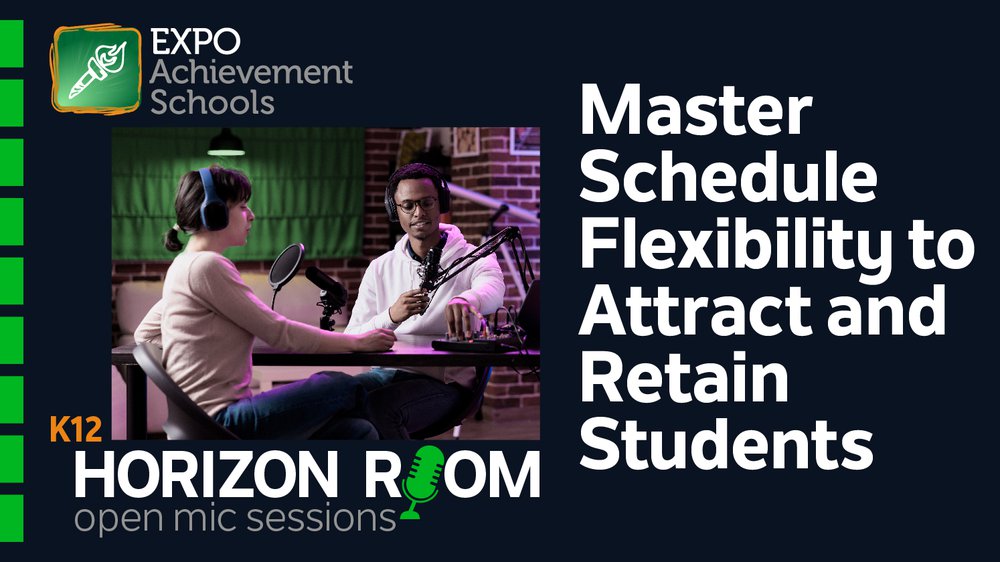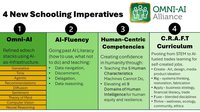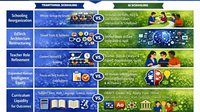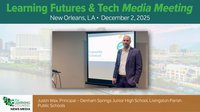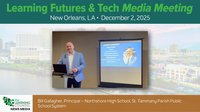Welcome to the next episode of the Horizon Room’s Open Mic series, a place where the education community can be part of a high-profile discussion on the challenges that need solutions.
Your hosts, Learning Counsel News Media and Research CEO LeiLani Cauthen and Learning Counsel CAO Chris McMurray, bring you a no-holds-barred conversation with innovative solutions. Sometimes raw, always entertaining and ALWAYS to the point, be prepared to find what you need for your own pressing problems at home.
In today’s episode, Cauthen and McMurray bring you an interesting take on the students that are leaving your schools seemingly en masse for better learning opportunities at home. According to McMurray, “We're talking about master schedule flexibility to attract and retain students, and the restrictions that are built into master schedules that are impacting your ability to shift and change.
“A hundred years ago (plus), an industrial model of education was built, and we started a transformation from what school used to be to this new industrial model of school. It was new and it was innovative, and it was built to prepare students for success in a workplace that was dictated by societal needs”
“The goal is to prepare students for the future, but it's a different future,” said Cauthen. So, when they were doing the industrial age model, what employers wanted was for people to shut up and do the work. They wanted them to all be the same. So, the model was built to normalize you, to make you the same and not a loudmouth. So, what was built was something that would create that outcome, and it still does. And we are still trying to butter over the problem of equity over the top of a model that is churning away at industrial age speed to create everybody the same. But today, what do we want? As employers we want the exact opposite of that.”
“We've made a shift toward a new future for kids. And we don’t know what that will look like, said McMurray. The fact that that teachers aren't available to fill classrooms is evidence. The fact that we still have student attrition, that's evidence as well. Change is afoot and you are either watching it happen to your system or you're actively engaged in joining the change. And that's where the excitement is.”
“I hear people say, ‘oh, you mean we're going to use spaces differently and we're going to use time differently,’ but we're being pushed to do that right now, said Cauthen “How are you using time differently? I think the time part is literally the hardest part. I could tell you horror stories about what we've gone through in terms of analysis of the time problem.”
“We have people that are working directly with us who are heading down a pathway to shift time in their system, said McMurray. And a lot of it comes down to master schedule and some of the antiquated constructs that we've built around. Time is probably the most valuable resource we have, so we all operate within a construct of time. And, the scheduling of that has been largely a sorting mechanism. It's a way to move students from one spot to another in an orderly fashion, and follows that old industrial model where science is taught in one room, and then you move to language arts and then you move to math, etc. And you do that in isolation. It's a single classroom, single content, single teacher type of a model. And, those schedules tend to stay rigid because they're blocked and people don't generally mess with those.
Fortunately, Cauthen, McMurray and their guests have no such reservations. By removing the sanctity from the master schedule, time use can be altered in a way that can deliver surprising results. In fact, this “technology” has the ability to remediate the effects of the teacher shortage and create reasons for the stream of departing students to rethink their decisions. Sometimes, genius is the unique ability to see the obvious. You’ll want to tune into this episode of the Horizon Room and allow your inner genius to learn from the geniuses on this podcast.

